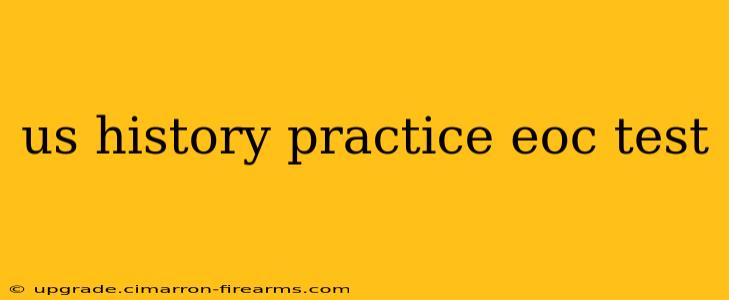The US History End-of-Course (EOC) exam can be a significant hurdle, but with the right preparation, you can conquer it. This guide provides invaluable strategies and resources to help you ace your test and boost your understanding of American history.
Understanding the US History EOC
Before diving into practice, it's crucial to understand the exam's format and content. Most EOC tests cover a broad range of historical periods and topics, typically spanning from colonization to the present day. Common themes include:
- Colonial America and the Revolution: Understanding the reasons for colonization, the growth of colonial societies, and the events leading to the American Revolution.
- The Early Republic and Westward Expansion: Examining the challenges faced by the newly formed nation, the development of political parties, and the expansion across the continent.
- Civil War and Reconstruction: Analyzing the causes and consequences of the Civil War, Reconstruction efforts, and the lasting impact on American society.
- Industrialization and Progressivism: Exploring the rapid industrial growth, social and economic changes, and the Progressive Era reforms.
- World Wars and the Cold War: Understanding America's role in both World Wars, the rise of the Cold War, and the domestic impact of these global conflicts.
- Civil Rights Movement and Beyond: Examining the fight for civil rights, social and political changes, and contemporary American history.
The exam typically includes a variety of question types, such as multiple-choice, short answer, essay questions, and potentially even primary source analysis. Knowing the format allows you to tailor your study approach effectively.
Effective Study Strategies for the US History EOC
Effective studying isn't just about memorizing dates and names; it's about understanding the historical context, analyzing cause and effect, and developing critical thinking skills. Here are some key strategies:
1. Create a Study Schedule:
Develop a realistic study plan that covers all the key topics and allows for regular review. Break down your study sessions into manageable chunks to avoid burnout.
2. Utilize Various Resources:
Don't rely solely on your textbook. Explore supplementary materials like online resources, documentaries, and historical fiction (used judiciously for context, not facts).
3. Active Recall and Practice Tests:
Instead of passively rereading notes, actively test yourself. Use flashcards, practice quizzes, and full-length practice tests to identify your weak areas. Many online platforms offer US History EOC practice tests mirroring the actual exam format.
4. Focus on Key Concepts and Themes:
Rather than memorizing individual facts, concentrate on understanding the underlying themes and connections between historical events. This approach will help you answer more complex questions effectively.
5. Analyze Primary Sources:
Learning to interpret primary sources (letters, diaries, photographs) is crucial. Practice analyzing these sources to understand different perspectives and historical contexts.
Finding High-Quality Practice Tests
Finding reliable and relevant practice tests is crucial for success. Look for tests that:
- Mirror the actual exam format: Pay close attention to question types and difficulty levels.
- Provide detailed explanations: Understanding why an answer is correct or incorrect is essential for learning.
- Cover a wide range of topics: Ensure the practice test adequately covers the breadth of the curriculum.
While specific practice test resources are not directly linked here (to avoid any potential conflicts of interest), a simple online search for "[your state] US History EOC practice test" will yield many results. Always evaluate the source's credibility before using any practice materials.
Mastering the US History EOC: Beyond the Test
The US History EOC is more than just a test; it's an opportunity to deepen your understanding of the nation's past. By employing effective study strategies and utilizing high-quality practice materials, you can achieve success and build a strong foundation in American history. Remember, consistent effort and a well-structured approach are key to acing your exam. Good luck!

